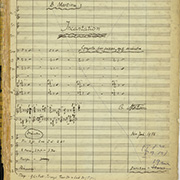Almost fifty years after the first edition of Bohuslav Martinů’s 4th Piano Concerto „Incantation“, Bärenreiter-Verlag is publishing new material based on the Critical Complete Edition.
„I have received a commission from Chicago for a thousand dollars“, Bohuslav Martinů announced to his relations in Polička on 22 November 1955. This was a commission from the Paul Fromm Music Foundation, which supported young artists from 1952 onwards. Martinů had been considering writing a further composition for his friend the pianist Rudolf Firkušný for over a year, therefore he decided on a concert piece for piano.
According to the date in Charlotte Martinů’s notebook, the composer began work on the composition on 22 December 1955. We can be certain that by the end of 1955 he already had a vague idea of the character and the composition of the work, as he reported to Miloš Šafránek: “Now […] I am getting down to the Invocation [sic] for piano and orchestra, a commission from Chicago, but I have said what I am going to write. It will be another haunting history, all ‘magic’ – at least I hope so […].”
Whilst working on the concerto, Martinů wanted to ask Firkušný’s opinion on the two-movement structure of the work, but also on its relative brevity: “It is ‘diabolique’, but it does have this advantage or disadvantage. I wanted to write it in two movements, partly in order to save myself some work, with this instrument you always have to write a lot of notes, and secondly I didn’t want to do anything like a piano concert with all the details and an extensive formal musical story. [...] The whole composition is to be a maximum of 18 minutes long, but now I don’t know whether that isn’t too short for a concert programme [...] Tell me then what you think about this [...].” The final form shows that Firkušný evidently did not want to change the concept Martinů had already worked out.
The concerto was completed on 6 February 1956. Martinů wrote to Šafránek a couple of days later about the title: “Otherwise I’ll slog away, I have this magic-story pro piano almost ready, and now I am no longer sure which title would be better, according to the dictionary Invocation is actually something like a prayer, and I think it should rightly be called Incantation.” The autograph score contains the title Martinů finally settled on – Incantation.
The premiere was given in an orchestral concert promoted by the Paul Fromm Foundation on 4 October 1956 in the Metropolitan Opera in New York; Leopold Stokowski conducted the New York Philharmonic. Martinů described the composition in the premiere programme as follows: “Incantation is a concerto for piano in the form of a symphony or fantasia. I am trying to come out of the traditional form on [sic] piano-concerto, which is geometrical and rather static and too much definit[e] and leave[s] a little opportunity to a free development. The choice of the title ‘Incantation’ needs, of course, some explanation. Webster[´s] dictionary describe[s] it as a spell, charm, magic and that’s exactly what I meant. Magic is a royaume [sic] of music. There is always some program in the musical piece. Now the question of ‘What you meant by it’, is rather embar[r]asing for a composer because he still believe[s] that music has to speak for itself. Amen.”
The European premiere of Incantation took place on Friday 30 August 1957 in the Usher Hall during the Edinburgh Festival, with the Philharmonia Orchestra of London conducted by Rafael Kubelík.
Incantation was not published during the composer’s lifetime, evidently because of Firkušný’s continuing exclusivity on the work, but it was published by Bärenreiter in 1970. The new edition is the result of studying of two contemporary copies of the autograph with manuscript comments by the composer. One of these was Rudolf Firkušný’s copy which he used to learn the piece, and, in view of the manuscript markings, which he probably used to consult the composer before the premiere; the second was the composer’s own copy with subsequent corrections.
- Bohuslav Martinů Institut Prague
- (from “[t]akte” 1/2019 – translation: Elizabeth Robinson)



